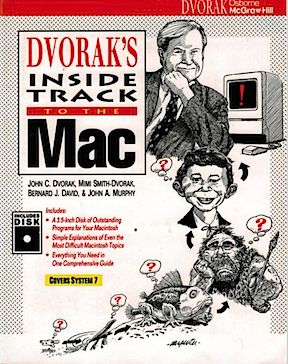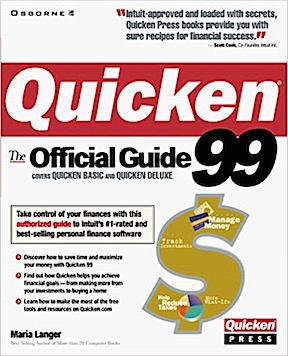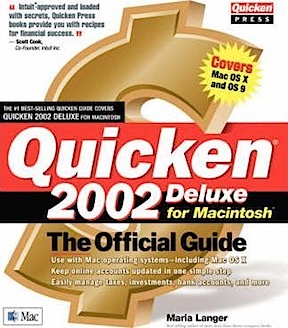A response to a reader’s request.
The other day, I got the following email message in my In Box with the subject line “Quicken 2017 for Mac”:
As I write these words your “Quicken 2002 Deluxe for Macintosh” book sits in front of me. The time has come, whether I like it or not, to update to Quicken 2017 for Mac from Quicken 2007 for Mac. Sadly, thee’s no good documentation to use. In fact, I haven’t found any good material since your 2002 book! For all I know, you’ve moved on and no longer write books such as the one published back then. That being said, I’d like to request you consider writing a new Guide similar to the one your wrote way back then. All the best to you whatever your future ventures may be.
First, I want to thank the sender for phrasing his request so politely and understanding that I might not be writing books like that one any more. A lot of the email messages I get regarding my writing work is a lot less polite and a lot more demanding, which partially explains why the Contact page on this blog seems to discourage communication from readers. (It’s actually toned down a lot more than it used to be.)
Now let me tell you a little bit about the rise and fall of tech publishing.
The “Old Days” of Tech Publishing

This is the first book I was involved in; I was a ghost writer on 4 chapters and am mentioned in the acknowledgements.
I got into the world of computer how-to book publishing way back in 1991. I’d left my last full-time job as a Financial Analyst at a Fortune 100 Corporation the year before and was trying my hand at freelance writing. Through an odd series of events, I wound up ghost writing four chapters of a book by John C. Dvorak, Bernard J. David (who I worked with directly), and others. That led to a book that Bernard and I co-authored, which led to another 80+ books that I mostly authored alone.
Back in those days, the Internet was in its infancy. Hardly anyone had a website — I didn’t have my first one until 1995 — and services like Google, which was founded in 1996 and wouldn’t become the powerhouse it is for years, didn’t exist. When people wanted to learn, they turned to books.
Software developers knew this. They provided printed manuals with their software products. Manuals for some software could be voluminous — I remember the one I had for a version of FrameMaker that had to be at least 800 pages. But despite the availability of these reference guides, users wanted something easier to read and understand. So computer how-to books were born. I happened to be at the right place at the right time to write them.
And I was very good at it. I had a knack for learning how to use software, breaking it down into simple tasks that built progressively through the book to more complex tasks, and writing it in a way that readers found helpful.
With a lot of competition, however, not many readers got to see my books and there wasn’t much money in writing them. No problem: I’ll just write more books. My publishers — especially Peachpit Press — really liked my work and my ability to meet deadlines. They kept me busy. I once signed six book contracts in a single day. One year, I wrote 10 books.
I wasn’t the only one cranking out books. Numerous publishers had tech imprints and dozens of new titles appeared every month. Bookstores — and there were a lot more of them in those days — had trouble keeping up, but they did. Publishers published these books and bookstores stocked them for one reason: they sold.
Demand only got higher as software developers stopped including lengthy manuals with their software, favoring Quick Start books instead. And then switching to digital only manuals that they might or might not include on the software CD.
Thus began the glory days of computer how-to book authors and publishers, a period that lasted from around 1995 through 2010.
Success Comes with Sales

This was one of my first bestsellers. Revised annually until I gave it up after the 2009 edition, it was a major source of income for me.
My financial success as the author of computer how-to books didn’t come from writing a lot of books with average sales. It came from writing two particular books, revised often, that were bestsellers. My Quicken 1999: The Official Guide was one of these bestsellers.

I was very happy to be able to write about Quicken for Mac, since I was a long-time user.
The success of one book often spurs a series of books. Quicken Press (later Intuit Press), an imprint of Osborne-McGraw-Hill, soon began publishing other Quicken and QuickBooks books. That’s how I wound up authoring Quicken 2002 Deluxe for the Macintosh: The Official Guide, the book referred to in the email message above.
I was pretty happy about this. Truth is, I’m a Mac user and had been writing Windows books only because there were more Windows users so the sales potential was higher. I’d been using Quicken on my Mac for years and knew it better than the Windows version I’d been writing about since 1998.
But my Quicken Mac book didn’t take off the way we’d hoped — there were a lot fewer Quicken Mac users and Intuit still had viable competition to Quicken on the Mac OS platform. To complicate matters, Intuit didn’t revise Quicken for Mac as often as it revised Quicken for Windows. When the next version, Quicken 2007, was released, neither Intuit nor my publisher saw a sufficient market for a book about it. So I was never asked to revise my book for future editions.
Google and the Death of Tech Publishing
Meanwhile, as publishers and authors were churning out computer books as fast as we could, the Web was growing. People were writing how-to articles and publishing them on blogs, on software support websites, on user group websites, and in online magazines. Even I did this for a long while, mostly to help promote my existing titles. These articles were free and available immediately. When search engines like Google proved to be extremely effective in helping readers find the content they sought, people started thinking twice about buying computer how-to books.
After all, why go to a bookstore or go online at Amazon to find a book that may or may not answer your specific question when you could spend a few minutes searching with Google and find the answer you need? Why wait for a book you ordered online to arrive when you could find the information you needed immediately? Why depend on the voice of one author when you could access information provided by dozens or hundreds of them?
Book sales dropped off dramatically in the late 2000s. I could see it in my royalty statements; my income peaked in 2004 and 2005 and then began a steady decline. Books about software staples like Word and Excel, that I’d revise with every new version, were dropped one after another. Publishers who had once agreed to a contract for nearly every title I proposed now declined, saying they didn’t think there was a sufficient market for the book. There were fewer and fewer new software-related titles being published. Editors who’d worked on dozens of titles a year suddenly found themselves unemployed. Publishers or imprints merged or disappeared. The few brick and mortar bookstores that managed to survive the rise of Amazon reduced or even eliminated their computer book shelf space.
By 2013, all of my book titles were officially dead — not scheduled for revision. And I know I’m not the only tech author who lived and thrived through the computer book glory days to find myself without a book market for my expertise. There are lots of us out there. The ones like me who saw it coming had a safety net to fall into; others weren’t so lucky and find themselves struggling to stay relevant and earn a living writing words few seem willing to pay for.
Don’t get me wrong — I’m not saying that computer how-to books no longer exist. They do. There just aren’t many of them. And rather than appeal to the beginner to intermediate user I wrote for, they’re mostly written for a much higher level of user about far more complex topics. Or very narrow markets that are easy to sell to.
This Reader’s Request
Fast forward to today.
The very politely worded email request from a reader quoted in full above is asking me to revise my Quicken 2002 for Mac book for Quicken 2017 for Mac. If you’ve been reading carefully, you know why this is unlikely to happen.
There is not a sufficient market for such a book.
And that’s what it’s all about: being able to publish a book that will sell enough copies for the publisher to make a profit. It has nothing to do with the author; publishers really don’t care what authors make. Their contracts routinely minimize author royalties to help the book’s bottom line. That’s all that matters. They have spreadsheets that calculate breakeven and if a title can’t break even with a decent profit, they won’t publish it. Simple as that.
Would I write and self-publish a book about Quicken 2017 for Mac? Probably not. Even self-publishing such a book doesn’t mean I’ll earn enough money to make such a project worthwhile. Let’s do the math. It would take me a good 400 hours of time over two months to write the book and prepare the manuscript for publishing. Say I need to make a minimum of $25/hour. That means the project would have to net me $10,000. Even if I managed to net $5/book after fees paid to Amazon, Apple iBooks store, Nook, etc., I’d still have to sell 2,000 copies. Are there 2,000 people out there willing to buy a book about Quicken 2017 for Mac? I seriously doubt it.
And I’ll share a secret with you: I still use Quicken 2007 for Mac. I bought but decided I didn’t like the 2015 version and I haven’t even bothered to buy the 2017 version.
So if I — a loyal Quicken user since the early 1990s — haven’t bothered to upgrade, how many other people have? And how many of them want a book about it?
The answer is simple: Not enough for me or apparently anyone else to write a book about it.
This Explains It
And this pretty much explains why I don’t write books about how to use computers and software anymore. I can’t make a living doing it.
But I’m lucky: at least I’ve found something else to make a living at.




 I emailed it this morning. I suspect the editor I sent it to will understand completely. But I don’t expect to be offered any money or any opportunities to write for them in the future.
I emailed it this morning. I suspect the editor I sent it to will understand completely. But I don’t expect to be offered any money or any opportunities to write for them in the future. Today, however, I started work on the book I’ve been thinking about for the past month or so. Tentatively titled Flying the Canyon: My Season as a Grand Canyon Helicopter Tour Pilot, this book will share my experiences from one of the most interesting summers of my life.
Today, however, I started work on the book I’ve been thinking about for the past month or so. Tentatively titled Flying the Canyon: My Season as a Grand Canyon Helicopter Tour Pilot, this book will share my experiences from one of the most interesting summers of my life. Today, I churned out over 4,000 words, completing the introduction (which I just shared here), a Prologue, and Chapter 1, which briefly covers my experiences learning to fly and getting my commercial pilot rating. My goal is to have the entire book finished by month-end — a goal I know I can reach if I can stay focused on my work. (With little else do do this winter, it shouldn’t be much of a problem to find time!)
Today, I churned out over 4,000 words, completing the introduction (which I just shared here), a Prologue, and Chapter 1, which briefly covers my experiences learning to fly and getting my commercial pilot rating. My goal is to have the entire book finished by month-end — a goal I know I can reach if I can stay focused on my work. (With little else do do this winter, it shouldn’t be much of a problem to find time!) I read an interesting essay on the New Yorker magazine’s website yesterday: “
I read an interesting essay on the New Yorker magazine’s website yesterday: “